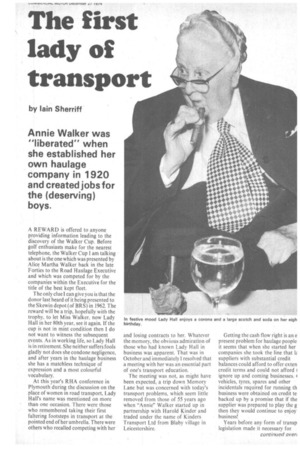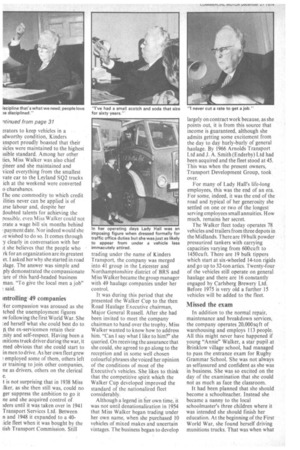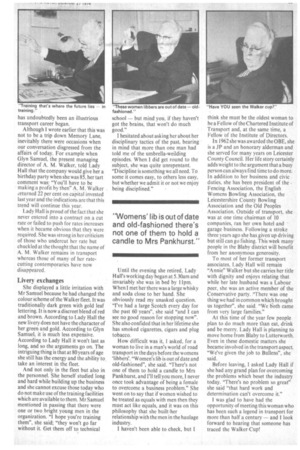The first lady of transport
Page 33

Page 34

Page 35

If you've noticed an error in this article please click here to report it so we can fix it.
by lain Sherriff
A REWARD is offered to anyone providing information leading to the discovery of the Walker Cup. Before golf enthusiasts make for the nearest telephone, the Walker Cup I am talking about is the one which was presented by Alice Martha Walker back in the late Forties to the Road Haulage Executive and which was competed for by the companies within the Executive for the title of the best kept fleet.
The only clue I can give you is that the donor last heard of it being presented to the Skewin depot (of BRS) in 1962, The reward will be a trip, hopefully with the trophy, to let Miss Walker, now Lady Hall in her 80th year, see it again. If the cup is not in mint condition then I do not want to witness the subsequent events. As in working life, so Lady Hall is in retirement. She neither suffers fools gladly not does she condone negligence, and after years in the haulage business she has a matchless technique of expression and a most colourful vocabulary.
At this year's RHA conference in Plymouth during the discussion on the place of women in road transport, Lady Hall's name was mentioned on more than one occasion. There were those who remembered taking their first faltering footsteps in transport at the pointed end of her umbrella. There were others who recalled competing with her
and losing contracts to her. Whatever the memory, the obvious admiration of those who had known Lady Hall in business was apparent. That was in October and immediately I resolved that a meeting with her was an essential part of one's transport education.
The meeting was not, as might have been expected, a trip down Memory Lane but was concerned with today's transport problems. which seem little removed from those of 55 years ago when "Annie" Walker started up in partnership with Harold Kinder and traded under the name of Kinders Transport Ltd from Blaby village in L eicest ersh ire. Getting the cash flow right is an e present problem for haulage people it seems that when she started her companies she took the line that IE suppliers with substantial credit balances could afford to offer exten credit terms and could not afford 1 ignore up and coming businesses. 1 vehicles, tyres, spares and other incidentals required for running th business were obtained on credit te backed up by a promise that if the supplier was prepared to play the g then they would continue to enjoy business!
Years before any form of transp legislation made it necessary for continued over, !rators to keep vehicles in a idworthy condition, Kinders insport proudly boasted that their iicles were maintained to the highest isible standard. Among her other ties, Miss Walker was also chief tineer and she maintained and viced everything from the smallest vate car to the Leyland SQ2 trucks ich at the weekend were converted o charabancs.
[he one commodity to which credit ilities never can be applied is of irse labour and, despite her doubted talents for achieving the possible. even Miss Walker could not !rate a wage bill six months behind payment date. Nor indeed would she re wished to do so. It comes through y clearly in conversation with her it she believes that the people who rk for an organization are its greatest et. I asked her why she started in road dage. The answer was simple and ply demonstrated the compassionate :ure of this iiard-headed business man. "To give the local men a job" said.
ontrolling'49 companies
Hier compassion was aroused as she tched the unemployment figures iw following the first World War. She :ed herself what she could best do to IA the ex-servicemen retain their ;nity and self-respect. Having been a initions truck driver during the war, it med obvious that she could start to in men to drive. As her own fleet grew employed some of them, others left er training to join other companies, ne as drivers, others on the clerical e.
t is not surprising that in 1938 Miss Iker, as she then still was, could no ger suppress the ambition to go it ne and she acquired control of iders until it was taken over in 1941 Transport Services Ltd. Between n and 1948 it expanded to a 40icle fleet when it was bought by the tish Transport Commission. Still trading under the name of Kinders Transport, the company was merged into 41 group in the Leicester and Northamptonshire district of BRS and Miss Walker became the group manager with 49 haulage companies under her control.
It was during this period that she presented the Walker Cup to the then Road Haulage Executive chairman, Major General Russell. After she had been invited to meet the company chairman to hand over the trophy, Miss Walker wanted to know how to address him. "Can I say what I like to him?" she queried. On receiving the assurance that she could, she agreed to go along to the reception and in some well chosen colourful phrases she voiced her opinion of the conditions of most of the Executive's vehicles. She likes to think that the competitive spirit which the Walker Cup developed improved the standard of the nationalized fleet considerably.
Although a legend in her own time, it was not until denationalization in 1954 that Miss Walker began trading under her own name, when she purchased 10 vehicles of mixed makes and uncertain vintages. The business began to develop largely on contract work because, as she points out, it is from this source that income is guaranteed, although she admits getting some excitement from the day to day hurly-burly of general haulage. By 1966 Arnolds Transport Ltd and J. A. Smith (Enderby) Ltd had been acquired and the fleet stood at 45. This was when the present owners, Transport Development Group, took over.
For many of Lady Hall's life-long employees, this was the end of an era. For some, indeed, it was the end of the road and typical of her generosity she settled on one or two of the longest serving employees small annuities. How much, remains her secret.
The Walker fleet today operates 78 vehicles and trailers from three depots in the Midlands. There are 19 bulk powder pressurized tankers with carrying capacities varying from 600cu ft to 1450cuft. There are 19 bulk tippers which start at six-wheeled 14-ton rigids and go up to 32-ton artics. Twenty-four of the vehicles still operate on general haulage and there are 16 constantly engaged by Carlsberg Brewery Ltd. Before 1975 is very old a further 15 vehicles will be added to the fleet.
Missed the exam
In addition to the normal repair, maintenance and breakdown services, the company operates 20,000 sq ft of warehousing and employs 113 people. All this might never have happened if young "Annie" Walker, a star pupil at Brinklow village school, had managed to pass the entrance exam for Rugby Grammar School. She was not always as selfassured and confident as she was in business. She was so excited on the day of the examination that she could not as much as face the classroom.
It had been planned that she should become a schoolteacher. Instead she became a nanny to the local schoolmaster's three children where it was intended she should finish her education. At the beginning of the First World War, she found herself driving munitions trucks. That was when what has undoubtedly been an illustrious transport career began.
Although I wrote earlier that this was not to be a trip down Memory Lane, inevitably there were occasions when our conversation disgressed from the affairs of today. For example when Glyn Samuel, the present managing director of A. M. Walker, told Lady Hall that the company would give her a birthday party when she was 85, her tart comment was: "You'll have to be making a profit by then" A. M. Walker ceturned 22 per cent on capital invested last year and the indications are that this trend will continue this year.
Lady Hall is proud of the fact that she never entered into a contract on a cut rate or failed to push for rates increases when it became obvious that they were required. She was strong in her criticism of those who undercut her rate but chuckled at the thought that the name of A. M. Walker remains in transport whereas those of many of her ratecutting contemporaries have now disappeared.
Livery exchanges
She displayed a little irritation with Mr Samuel because he had changed the colour scheme of the Walker fleet. It was traditionally dark green with gold leaf lettering. It is now a discreet blend of red and brown. According to Lady Hall the new livery does not have the character of her green and gold. According to Glyn Samuel, it is much less expensive. According to Lady Hall it won't last as long, and so the arguments go on. The intriguing thing is that at 80 years of age she still has the energy and the ability to take an interest in the fleet.
And not only in the fleet but also in the personnel. She herself studied long and hard while building up the business and she cannot excuse those today who do not make use of the training facilities which are available to them. Mr Samuel mentioned in passing that there were one or two bright young men in the organization. "I hope you're training them", she said; "they won't go far without it. Get them off to technical school — but mind you, if they haven't got the brains, that won't do much good."
I hesitated about asking her about her disciplinary tactics of the past, bearing in mind that more than one man had told me of the umbrella-weilding episodes. When I did get round to the subject, she was quite unrepentant. "Discipline is something we all need. To some it comes easy, to others less easy, but whether we admit it or not we enjoy being disciplined."
Until the evening she retired, Lady Hall's working day began at 5.30am and invariably she was in bed by Ilpm. When I met her there was a large whisky and soda close to her hand. She obviously read my unasked question. "I've had a large Scotch every day for the past 60 years", she said "and I can see no good reason for stopping now". She also confided that in her lifetime she has smoked cigarettes, cigars and plug tobacco.
How difficult was it, I asked, for a woman to live in a man's world of road transport in the days before the womens 'libbers'. "Women's lib is out of date and old-fashioned", she said. "There's not one of them to hold a candle to Mrs Pankhurst, and I'll tell you more, I never once took advantage of being a female to overcome a business problem." She went on to say that if women wished to be treated as equals with men then they must act like equals, and it was on this philosophy that she builtlher relationship with the men in the haulage industry.
I haven't been able to check, but I think she must be the oldest woman to be a Fellow of the Chartered Institute of Transport and, at the same time, a Fellow of the Institute of Directors.
In 1962 she was awarded the OBE, she is a JP and an honorary alderman and she served for many years on Leicester County Council. Her life story certainly adds weight to the argument that a busy person can always find time to do more. In addition to her business and civic duties, she has been president of the • Fencing Association, the English Womens Bowling Association, the Leicestershire County Bowling Association and the Old Peoples Association. Outside of transport, she was at one time chairman of 10 companies, ran her own hotel and garage business. Following a stroke three years ago she has given up driving but still can go fishing. This week many people in the Blaby district will benefit from her anonymous generosity.
To most of her former transport associates, Lady Hall will remain "Annie" Walker but she carries her title with dignity and enjoys relating that while her late husband was a Labour peer, she was an active member of the Conservative party. "There was one thing we had in common which brought us together", she said. "We both came from very large families."
At this time of the year few people plan to do much more than eat, drink and be merry. Lady Hall is planning to move home from Blaby to Lutterworth. Even in these domestic matters she became involved in the transport aspect. "We've given the job to Bullens", she said.
Before leaving, I asked Lady Hall if she had any grand plan for overcoming the problems which beset the industry today. "There's no problem so great" she said "that hard work and determination can't overcome it."
I was glad to have had the opportunity of meeting this woman who has been such a legend in transport for more than half a century — and I look forward to hearing that someone has traced the Walker, Cup!




































































